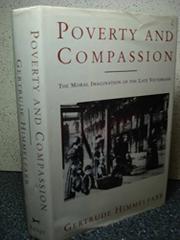In this erudite, sweeping, and subtle study of attitudes toward the poor in late Victorian England, formidable intellectual historian Himmelfarb (The New History and the Old, 1987; The Idea of Poverty, 1984, etc.;  History/CUNY) shows that she is as gifted with “moral imagination” as the philanthropists she so much admires. Using Charles Booth’s 17-volume Life and Labour of the People of London (1982), Himmelfarb begins by distinguishing between statistical and perceived poverty, exploring the enigma of how, statistically, there could have been as much poverty at the close of the 19th century as Malthus and Mayhew had claimed earlier (about 30% of the population) although the quality of life had improved, with the poor having the advantages of more education, sanitation, housing, health care, security, and pensions.
History/CUNY) shows that she is as gifted with “moral imagination” as the philanthropists she so much admires. Using Charles Booth’s 17-volume Life and Labour of the People of London (1982), Himmelfarb begins by distinguishing between statistical and perceived poverty, exploring the enigma of how, statistically, there could have been as much poverty at the close of the 19th century as Malthus and Mayhew had claimed earlier (about 30% of the population) although the quality of life had improved, with the poor having the advantages of more education, sanitation, housing, health care, security, and pensions.
A humanitarian businessman, Booth was primarily concerned with helping the laboring or “deserving” poor as opposed to the destitute, those without access to these advantages. Similar humanitarian efforts based on science and morality were organized through secular charities, socialist religions, and odd groups such as the Salvation Army and trade unions, as well as through such individuals as Octavia Hill, who appropriated small clusters of houses all over London for the poor. The fear was that the poor would become dependent on assistance, that charity would become welfare. And that, Himmelfarb explains, is exactly what happened through the reforms of socialist groups such as the Marxists and Fabians, leading ultimately to the nationalization of resources, though not property, and the distribution of benefits among all those who fell below some arbitrary level of acceptability. Difficult, provocative, eloquent, and packed with original observations relevant to our time. Himmelfarb concludes that, although the definition of poverty will change, there will always be a stable reservoir of poor requiring the social conscience, compassion, and charitable action exemplified by the later Victorians.
From a review of POVERTY AND COMPASSION
The Moral Imagination of the Late Victorians (Kirkus)
